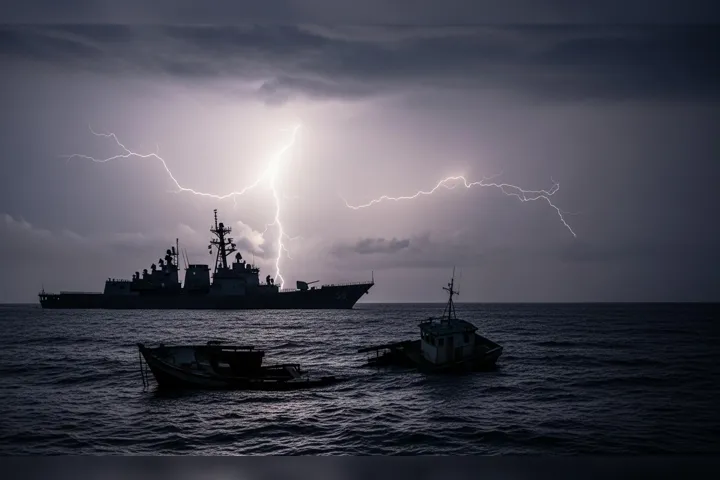
US Military Conducts Second Strike on Alleged Drug Boat in Pacific, Resulting in Casualties

What's Happening?
The United States military has executed a second strike on a vessel suspected of drug smuggling in the Pacific Ocean. This operation, directed by President Trump, resulted in the deaths of three individuals, with no reported casualties among US forces. The strike follows a similar operation conducted a day earlier, which also targeted a boat believed to be transporting drugs along established trafficking routes in international waters. According to Defense Secretary Pete Hegseth, these actions are part of an ongoing campaign against seaborne drug smuggling, marking the eighth and ninth such strikes since early September. While most previous operations have occurred in the Caribbean Sea, these recent strikes represent the first in the Pacific Ocean.
Why It's Important?
The US military's intensified operations against drug smuggling vessels underscore the administration's commitment to combating drug trafficking, which is often linked to broader issues of national security and public health. By targeting these vessels, the US aims to disrupt the supply chains of narcotics that contribute to domestic drug abuse and related criminal activities. The operations also highlight the administration's stance on treating drug traffickers as narco-terrorists, reflecting a hardline approach to international drug enforcement. This could have significant implications for US foreign relations, particularly with countries in Latin America, where many of these trafficking routes originate.
What's Next?
President Trump has indicated that the US is prepared to expand its anti-drug operations to land targets, which would require congressional approval. This potential escalation could lead to increased military involvement in regions known for drug production and trafficking. The administration's actions may provoke responses from affected countries, potentially straining diplomatic relations. Additionally, there may be domestic debates regarding the legal and ethical implications of such military interventions in international waters and potentially on foreign soil.
Beyond the Headlines
The classification of drug traffickers as narco-terrorists raises questions about the legal frameworks governing military actions against non-state actors. This approach blurs the lines between law enforcement and military operations, potentially setting precedents for future engagements. The ethical considerations of using lethal force in drug interdiction efforts also warrant scrutiny, as they involve complex issues of sovereignty and human rights.
AI Generated Content
For the benefit of users - Parts of this article may include content generated using AI tools. Our teams are making active and commercially reasonable efforts to moderate all AI generated content. Our moderation processes are improving however our processes are carried out on a best-effort basis and may not be exhaustive in nature. We encourage our users to consume the content judiciously and rely on their own research for accuracy of facts. We maintain that all AI generated content on our platform is for entertainment purposes only. To know more about how we use AI, you can write to us at
Close AI Generated Content